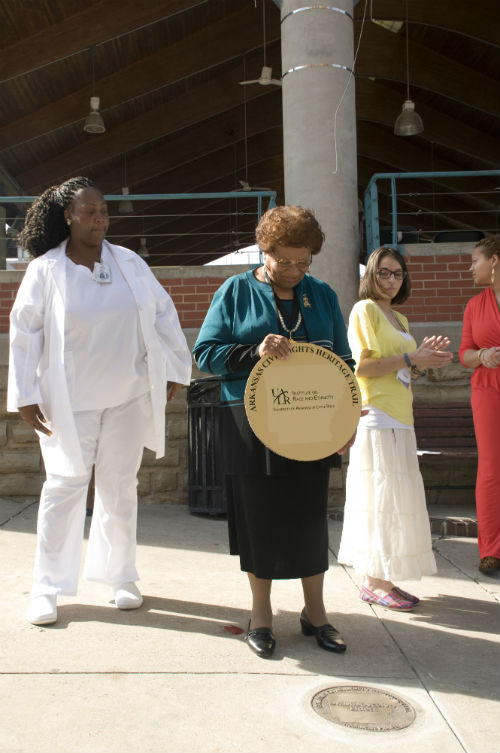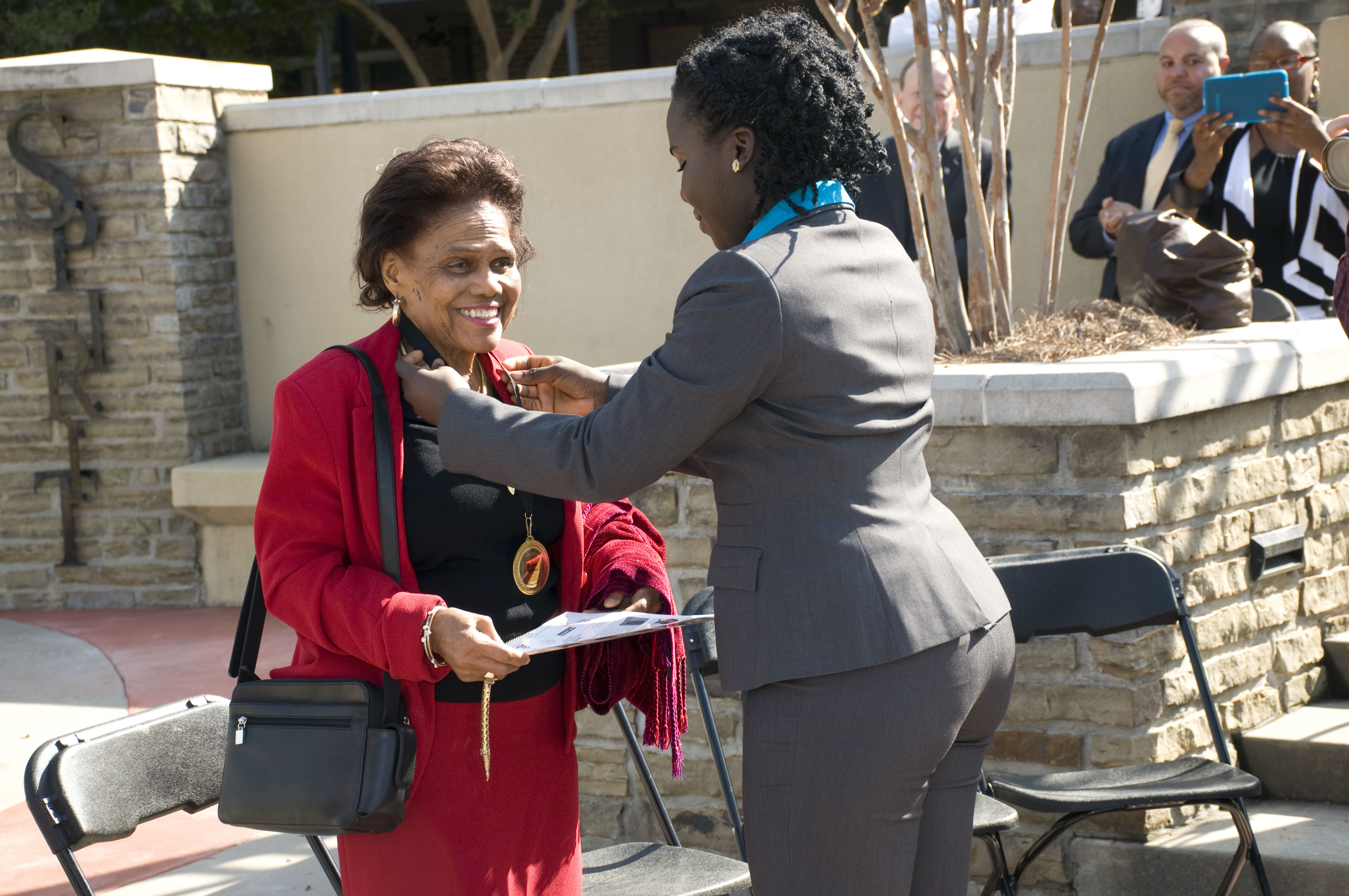Health care pioneers honored at Civil Rights Heritage Trail Unveiling
The St. Vincent Plaza and Patio in the River Market District was filled with spectators gathered to honor 10 health care professionals who have made contributions to society through their advances in medicine and service to their patients.
Drs. Thomas A. Bruce, M. Joycelyn Elders, Henry Foster Jr., Edith Irby Jones, and Billy Ray Thomas received the honor of having their names engraved on bronze commemorative markers and added to the Arkansas Civil Rights Heritage Trail on Oct. 24.
Posthumous honors were bestowed upon Drs. Cleon A. Flowers Sr., Samuel Lee Kountz, and John Marshall Robinson; registered nurse Lena Lowe Jordan; and scientist and educator Phillip Leon Rayford, Ph.D. These honorees were represented by family members or colleagues.
“This is the fourth year of the Arkansas Civil Rights Heritage Trail—honoring persons, often unsung, who have played a significant role in moving Arkansas toward greater racial justice,” said Joel E. Anderson, chancellor of the University of Arkansas at Little Rock.
“This year we honor pioneers who have worked in various ways to provide medical education and access to health care for minorities,” he said.
The crowd watched as identical twins Dolapo and Bukola Odeniyi, UALR graduates now enrolled as dual M.D.-Ph.D. students at the University of Arkansas for Medical Sciences, cloaked the honorees and representatives with medals designed as replicas of the markers on the Heritage Trail.

“It was a fitting tribute to have the twins be a part of this experience. We are very proud of their accomplishments while at UALR and of the work they are now doing at UAMS. They are a testament to the work and sacrifices made by our honorees,” said Dr. Michael R. Twyman, director of the UALR Institute on Race and Ethnicity, host of the annual event.
Twyman opened the ceremony by reminding the crowd of the occasion.
“Arkansas can proudly boast of having produced some of the nation’s best and brightest medical professionals,” he said. “For those who received their professional education and training during the 1950s, 60s, and even 70s, whether black or white, it occurred at a time of deep civil unrest in the country and in the state.”
One such person is Edith Irby Jones. She became the first black person to be admitted and graduate from UAMS in 1952. Jones spent her career helping the less fortunate gain access to quality health care. She co-founded a hospital for the poor in southeast Houston and established a medical clinic in Haiti, among other contributions.
Jones said she did not accomplish what she did on her own; she had the support of many in the state.

“So many people in Arkansas helped me while I was in medical school. I came to school with so many dimes, nickels, and quarters sent to me from people from all over the state, I lived like a queen,” Jones quipped.
Thomas, vice chancellor for diversity affairs at the University of Arkansas for Medical Sciences, seemed to agree with the sentiment that a culture of helping others increased diversity at UAMS.
“I am honored to be recognized (alongside) such accomplished people,” said Thomas. “It is also a very humbling experience because many of these people sitting here were my advisors or my mentors.”
Elders, the first African American U.S. Surgeon General and only the second woman named to the post, is experienced as a catalyst for change. She urged the crowd to continue striving for change as the need arises.
“The work that UALR and UAMS are doing is bold. (Leaders at UALR and UAMS) are trying to make a change in the world,” Elders said. “Change is certain. Growth is optional.”
Learn more about each honoree at arkansascivilrightsheritage.org, a website supported in part by a grant from the Arkansas Humanities Council and the National Endowment for the Humanities.
In addition to the Center for Diversity Affairs at UAMS, other event sponsors were the Central Arkansas Planning and Development District; East Harding Inc.; City of Little Rock; Arkansas Medical, Dental, and Pharmaceutical Association; Just Communities of Arkansas; the Little Rock Alumnae Chapter of Delta Sigma Theta Sorority, Inc.; and the Little Rock Alumni Chapter of Kappa Alpha Psi Fraternity Inc.
About the Civil Rights Heritage Trail
The Arkansas Civil Rights Heritage Trail was created in 2011 to acknowledge the sacrifices and achievements made by those who have fought for racial justice in the state. The Heritage Trail begins at the Old State House and stretches to the front of the Little Rock Regional Chamber of Commerce and in the St. Vincent Plaza in the River Market District. As commemorative bronze markers are added each year.
About the UALR Institute on Race and Ethnicity
The UALR Institute on Race and Ethnicity was founded in July 2011. With a vision to make Arkansas the best state in the country for promoting and celebrating racial and ethnic diversity, the institute conducts research, promotes scholarship and provides programs that address racial inequities. It does so by facilitating open and honest dialogue aimed at empowering communities and informing public policy to achieve more equitable outcomes.
Keep up with what’s happening; subscribe to UALR Now.
